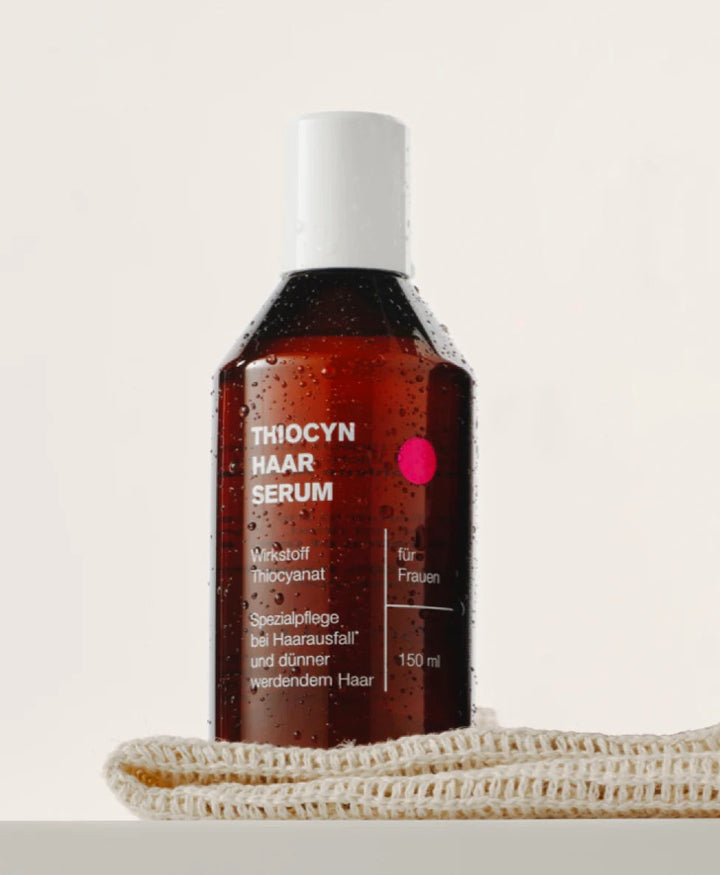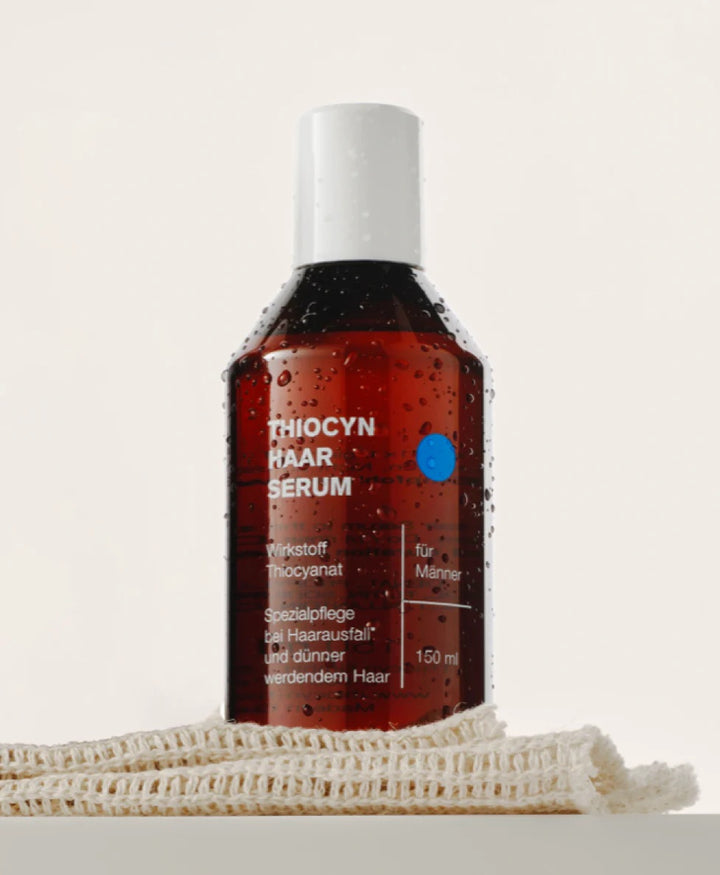| 04. July 2023
Hormonal hair loss

- Women are more often affected by hair loss than men.
- The cause of hair loss and temporary thinning of hair is often fluctuations in hormones, especially estrogen levels.
- Particularly noticeable: hair loss after pregnancy or after stopping the pill.
- Diffuse hair loss and hereditary hair loss often occur in women during menopause.
The causes of decreasing hair loss in women are more diverse than in men. Often, they are severe psychological or physical stress, stress, or depression. Poor nutrition, for example, as a result of an unbalanced diet, can also lead to hair loss. Iron deficiency. However, the most common cause of hair loss is hormonal-related: after stopping oral contraceptives (the pill), after pregnancy, or during menopause.
Causes: Hormonal hair loss
Hair density, hair quality, the duration of the hair cycle, and not least excessive hair loss are highly influenced by hormones. Estrogens and androgens, “female” and “male” sex hormones, are in an imbalance, the likelihood of women experiencing hormonal Hair loss When hormones go haywire in the body, affected women suffer from numerous symptoms: hair loss is one of them.
Hair loss after pregnancy
When high levels of estrogen circulate in the body during pregnancy, expectant mothers enjoy beautiful, thick hair and smooth skin. However, after birth, estrogen levels drop significantly. Hair that was in a prolonged growth phase now falls out within a few weeks, two to three months after birth.
This excessive hair loss after months of luscious hair seems puzzling and worrying. But these worries are unfounded. After a resting period, the hair follicles begin producing hair again, and the hair cycle usually normalizes on its own.
Hair loss after stopping the pill
A similar effect to that after pregnancy occurs when hormonal contraceptives such as the contraceptive pill are discontinued. pill While initially taking the pill, due to the additional estrogen added to the body, it usually has a positive effect on hair, this effect is reversed for many women after stopping the pill. Here, too, women notice a temporary increase in hair loss a few weeks later, after elevated estrogen levels have subsided. However, this is not cause for concern, as a new hair cycle begins.
Hormonally induced hair loss during menopause
The primary cause of increased diffuse hair loss in women around menopause is an estrogen deficiency. Many hair follicles cease their growth phase due to a lack of estrogen. Many women then experience hereditary hair loss as a result of a relative increase in androgen levels: genetically misprogrammed hair follicles or hair roots react sensitively to the testosterone derivative DHT (dihydrotestosterone). After hair loss, the hair regrows, but the hair follicles miniaturize.
Hair thinning may be very subtle at first. However, more and more hairs that grow back are not longer than downy hairs and fall out more frequently. Eventually, the hair follicles stop producing hair, and a noticeable decrease in hair density becomes apparent.
Hair loss: Cause age
Parallel to the hereditary hair loss In women in their fifth decade of life, the age-related weakening of hair follicles slowly becomes noticeable: The hair takes longer to regenerate. A weakening of the scalp's blood flow can also negatively affect cell metabolism at the hair roots and promote diffuse hair loss. If a slowed regeneration phase of the hair follicles, diffuse hair loss and hereditary hair loss overlap, the hair thins even more.
Active ingredient thiocyanate
An active ingredient that strengthens the hair roots and protects them against growth-disrupting factors is the natural molecule ThiocyanateThe patented thiocyanate formula of Thiocyn Hair Serum promotes cell division directly at the hair root, where hair growth occurs.
The constant growth process at the hair root also benefits from the fact that thiocyanate neutralizes free radicals at the hair roots and supports glycolysis, the gradual breakdown of simple sugars in energy metabolism. This ensures that the hair follicles are supplied with sufficient nutrients, fundamentally counteracting gradual hair loss.
Questions for our service team
How many women are affected by hormonal hereditary hair loss?
A good quarter of women struggle with hair loss.
How much does hair increase during pregnancy?
Hair volume increases by around 10% due to excess estrogen.
How long does it take for hair to grow back after pregnancy or after stopping the pill?
The hair follicles need a resting period of two to three months for regeneration. Then a new hair cycle, or growth phase, begins.
Why do hormone imbalances cause hair loss?
Hormones like estrogen play an important role in hair cellular metabolism. As messenger substances, they send signals to the hair roots for cell division and growth. If these signals are missing, the hair follicles end the growth phase, and hair loss occurs.
Wouldn't taking hormones be beneficial to combat hair loss during menopause?
There is currently no study that could show that hair loss around menopause can generally be stopped and hair growth stimulated through hormones, i.e. hormone therapy.
Now around 50 my hair suddenly starts breaking off, why?
As a result of disrupted cell metabolism at the hair roots, keratinization defects occur during hair formation. Hair breakage occurs due to washing, brushing, or styling. However, these mechanical stimuli are not the cause of hair loss.
Are men with receding hairlines also affected by hormonal hair loss?
Since hair loss in men has a hormonal cause—the hair roots are sensitive to DHT, but there is no hormonal imbalance—dermatologists refer to it as hereditary hair loss. This means that the sensitivity of certain hair follicles to DHT is inherited.
So what is androgenetic alopecia?
Androgenetic alopecia literally means hairlessness caused by androgens (such as DHT).Since hairlessness in the form of receding hairlines and baldness is very common in men with hereditary hair loss, the term is more commonly used in connection with hair loss in men.
Read by 23,000 people
Do it like 23,000 others and find out how you can improve your hair health - with great offers and discounts as well as helpful advice











